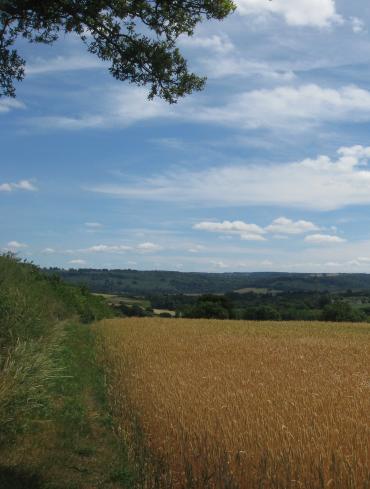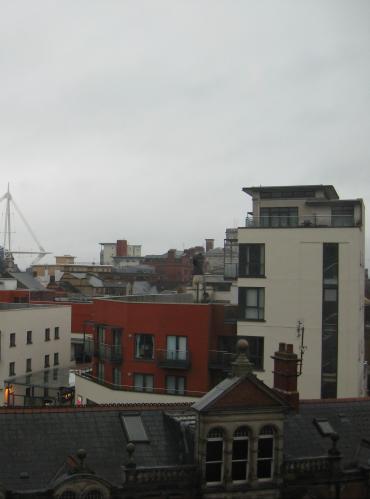|
Someone's getting worried about us producing
too much dangerous gases from our power stations and carrying
on doing so by building loads of gas-fired power stations to
keep us going for 50 years longer (or until the gas runs out
- knowing our government, they will try to make it whichever
is later).
It would be nice if the environmentalists
could agree on how you want to be environmental. Some time ago
someone (a very clever someone) recommended putting a fleet of
wind turbines on top of some wild, open moorland at a place called
Shap, in Cumbria, Northern England. Very nice idea, it was agreed
by a lot of people. Just next to the M6 and the electrified,
high speed West Coast Mainline. It would be difficult to increase
on the noise produced there really, you might think, though the
government did manage it before by building the M6. However,
it's very remote, the natural habitats have been ruined already,
the landscape is spoilt forever, there's lots of constant wind,
and the wind turbines, as mentioned before, would be hard put
to increase the amount of noise there.
The environmentalists blacked this idea, even
though it involves drastically cutting the greenhouse gases they're
against. Most of them had probably never even been there before.
But they made so much noise we didn't even hear what Shap had
to say on the subject.
We have reasons for blacking wind turbines
too though, and our rules for renewable energy are noted in public
for the first time ever here:
So there.
Now we think that one of the best ideas is
geothermal energy which involves taking a load of cold water
and pouring it down a hole, expected to be at least 7 km (4.375
miles) deep, to a load of hot rocks underground with big cracks
between them. The water seeps through the cracks and is then
drawn up out of another pipe as steam to a turbine, which it
drives in the normal manner. That technology is there no problem,
and after tunnelling under the Alps, parts of the Andes, the
Rocky Moutains, most of London, New York and Paris, the English
Channel and the Severn Estuary (the Severn Tunnel is about 7
km long) digging a vertical hole downwards should be no trouble.
Also the steam should rise up the shaft under some very simple
laws of Physics, thereby leaving this as a no-energy-input, massive-energy-output
idea.
While previous scientific discoveries mean
that we should have the required hot rocks available anywhere,
transporting all that water to the plant by rail (see demand
2) will cost an awful lot of money.
Tidal energy is a good idea. Harness all those
tides we've got around the place doing us no work except for
smoothing out some kid's work for the day on your local beach
or removing all that litter and sewage you don't want any more
to somewhere more convenient i.e. the next beach along the coast.
Stick a dam across the Severn estuary and
it will a) shorten the distance by road and rail from Barry to
Minehead and b) allow you to generate loads of cheap electricity
by getting the waves to turn turbines. Very cheap. Except for
building the dam, which the Severn will promptly try to wash
away. Do it right and it won't impede shipping or the movement
of Severn fish. The Severn goes up and down so much in the Bristol
Channel thereabouts it doesn't exactly need to be a dam - the
amount of water flowing through it will have a good enough effect
anyway - so it could just be a bridge with turbines in some of
the arches.
Except the environmentalists, desperate to
save our environment from the closure of the local coal-fired
power station, are fighting back (again). If your respective
all-important deity had just put in an application to build a
world with green trees, happy species and a couple of humans
("only a week's disruption, if that") he'd never get
planning permission these days.
So much for that.
No-one's really followed hydro-electricity
enough really. Most of the hydro-electric plants installed so
far have been in rural mountainous areas where they've been left
to get on with life in peace and quiet. There they have successfully
generated large quantities of electricity at fairly minimal expense
in terms of organising fuel, which tends to precipitate into
the relevant areas at irregular intervals.
Now we aren't so much recommending covering
the countryside in a few thousand of these, but we are suggesting
putting a turbine into all reservoir dams around the country
to generate some cheap energy for the locals thereabouts. Shouldn't
be too expensive, and planning permission shouldn't be too hard
to get, given that the dams are already there.
The other one is solar energy. As we are looking
at Great Britain (land of gentle breezes and cool showers!) here,
we'll rule this one out for major use, though everyone can choose
to implement this option as they wish.
And on biomass - cow's intestines ok, animal
and human dung fine, trees ummm. Trees do take a long time to
grow, in case you haven't noticed, but not very long to burn.
Sometime we'll put this to a practical test by setting fire to
a small willow (dead, of course) and seeing if we can boil half
a ton of water off it.
Nuclear power is in from time to time, but
whenever anything goes wrong with a nuclear power plant so much
hot air is produced it should be possible to power most of the
country on the wittering. The Government also never seems to
have the confidence in the technology to install such power plants
in the middle of London, so we assume from that that they aren't
really all that safe.
Or we just use the supplies of coal we still
have. Should be possible to mine it cheaply by now.
This is the end of our argument.
This article was originally released on
the Seasonal Area on 16th April 2006 and was brought here as
old news 29th April 2006 (news doesn't remain news for very long).
Slight tweaks and corrections were made in March 2011. It may
occasionally be returned to the public interest. |



